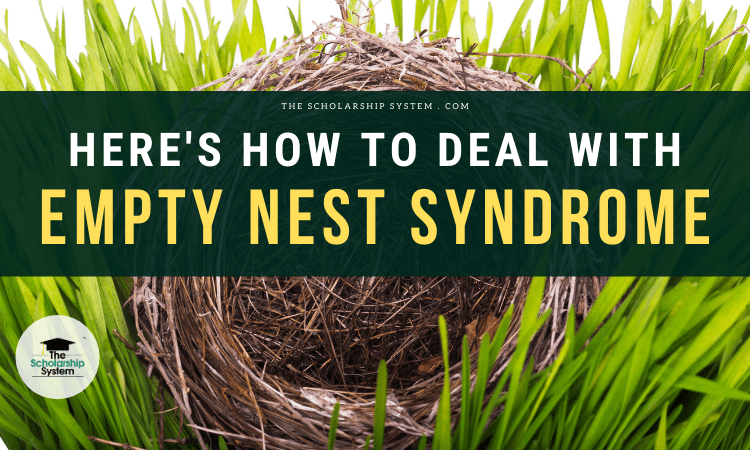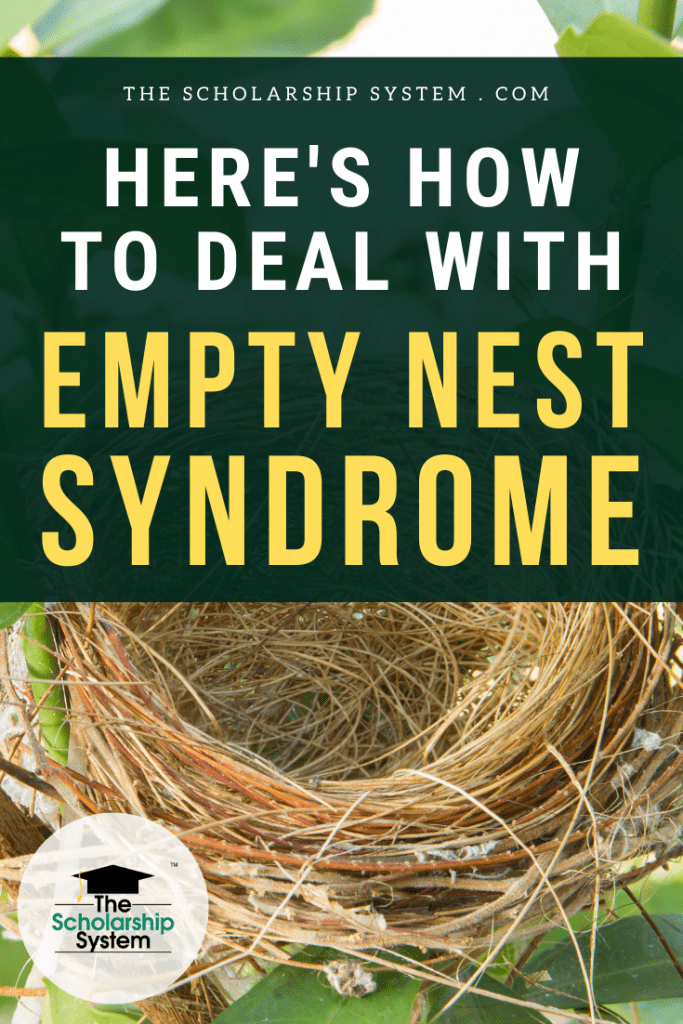Updated on July 14th, 2022
How to deal with empty nest syndrome is something that ends up on most parents’ minds. While your student heading off to college is, of course, exciting, it is also scary. Not only does it mark a substantial change in your student’s life, but it also marks a significant shift in your own. As a result, conflicting emotions are common.
While you might be thrilled that your student is taking a big step toward securing their future, you may also worry about feeling lonely or seeing your purpose in life change. At times, you may relish the sense of freedom that arises, only to feel guilty for feeling that way. You might even struggle to figure out what to do with that freedom, leaving you frustrated.
Luckily, it is possible to figure out how to deal with empty nest syndrome effectively. If you aren’t sure where to begin, here’s what you need to know.
Is your student hunting for college scholarships? If so, we can help! If you and your student want to learn more about how to find scholarship opportunities, sign up for our free college scholarship webinar! Take a trip over to http://thescholarshipsystem.com/freewebinar to reserve your spot today.
Contents
What Is Empty Nest Syndrome?
Empty nest syndrome is when parents have notable feelings of loss and sadness after a child leaves home. It isn’t an official medical condition, though it can potentially trigger mental health concerns like depression and anxiety.
While most parents are happy that their students are becoming independent, the transition can be painful. You may miss being a part of your student’s daily life and their presence in yours. You might also struggle with your identity since, while you’re still a parent, parenting isn’t part of your every day anymore.
As with many mental health-oriented struggles, empty nest syndrome can vary when it comes to severity. In milder cases, parents may feel the occasional bout of loneliness or longing for the time when their student was home.
With severe empty nest syndrome, the symptoms may match major depression. A parent may question their worth now that they aren’t actively caring for a child at home, have debilitating sadness or loneliness, and more.
Anxiety can also be common. Fearing for your student’s safety or wondering if they’ll be able to thrive on their own may be part of the equation. Similarly, struggling to adjust to your new identity may also produce feelings of anxiety.
How Long Does Empty Nest Syndrome Last?
There isn’t a hard-and-fast timeline for empty nest syndrome. For some, it is relatively brief, while others may struggle with it for months or longer.
The symptoms of empty nest syndrome may also ebb and flow. You may be fine most days only to experience something that makes you miss your student, bringing the sense of anxiety, sadness, or loss back.
If feelings of sadness, loneliness, depression, or anxiety are ongoing, or if they become disruptive to your life, seeking help from a medical professional is wise. While empty nest syndrome isn’t a formal diagnosis, many of the symptoms align with other mental health conditions that are treatable. By working with a professional, you can get the support you need while you adjust, ensuring you can regain your footing and move forward as quickly as possible.
How to Deal with Empty Nest Syndrome
In many ways, dealing with an empty nest is best done in two stages. If possible, parents should prepare for their student’s exit from the home before it happens, allowing them to have a plan in place that will help them adjust.
Additionally, it’s smart to recognize that how you think you’ll respond and how you actually react to an empty nest may not line up. As a result, you might have to change course after your student leaves.
With that in mind, here is a look at how to cope with an empty nest, making use of both stages.
Preparing for an Empty Nest
Reenvision Your Identity
For the past 18 or so years, you’ve been a parent, someone’s “mom” or “dad.” While that fact never really changes, it doesn’t have to be your primary identity anymore.
Instead, as your student gets ready to head to college, it’s a great time to try on new hats. Consider yourself as a “spouse,” a “friend,” and a “professional.” Maybe “world traveler” or even “student” feels like a better fit. The choices are yours; embrace it for the opportunity that it is!
You don’t have to limit yourself to just one, so take the time to see which options resonate with you. This is a perfect moment to reenvision yourself as an individual and steer your life in a direction that appeals to you the most.
Find New Challenges to Take On
In many ways, an empty nest is an opportunity. You may have more time to learn and grow as a person, which can be quite exciting.
Consider what new challenges appeal to you, then start making plans to take them on once your student heads to college. This can include anything from seizing new professional opportunities to finding hobbies for empty nest couples that you and your spouse would enjoy.
By figuring out what new challenges catch your eye before your student moves, you give yourself something to look forward to about being an empty nester. That can make the transition easier, as you’re embracing your new life stage with enthusiasm, allowing you to see the benefits of this incoming phase.
Adapting to an Empty Nest
Reignite Your Other Relationships
If you’ve let other relationships fall to the wayside while you were raising your child, now is also a perfect time to rekindle them. Whether you and your spouse haven’t had the opportunity to connect as adults as often or your circle of friends was based entirely on sharing parenthood experience, you can work to forge stronger relationships with the other people in your life as you get used to having an empty nest.
Stay Connected
Dealing with an empty nest doesn’t mean you have to abandon your relationship with your student. Finding ways to stay connected is actually a great idea and may even make the transition easier. The sense of loss may lessen if you remain an active part of their lives, even if you aren’t touching base daily.
Video chat and text messaging can help fill the gaps as both you and your student get used to being separated. You can still learn about what is happening in their lives, offer comfort, and even see them regularly. Just because they aren’t living under your roof doesn’t mean the connection has to falter, so look to technology to help you both keep in touch no matter the number of miles there are between you.
Just make sure also to give your student some space. While it’s hard, they need to gain their own footing. Being too involved won’t help either of you adapt, so try to find balance as your relationship evolves.
Make Plans to Get Together
Just because your child has headed off to college doesn’t mean you won’t be able to get together again soon. In fact, there are a lot of opportunities for visits.
Now, that doesn’t mean you should fly or drive out to see them during the school year without notice. However, talking to your student and making plans to head to their campus on the next “family weekend” hosted by the school could be a good idea. Attending an event like that can do a lot to put your mind at ease, as it gives you a chance to see how things are going with your student now that they have begun their college experience.
It’s also important to remember that the school year is filled with holidays. Thanksgiving, winter break, spring break, and next summer will all come along faster than you anticipate, so make plans to get together now. Anything from spending time at home to heading out to a favorite vacation spot together should be on the table. That way, you both have some family bonding time to look forward to, which can make it easier to adjust.
Just make sure to realize that they may want to spend some of their time off with friends, so don’t force them to fill your empty nest every time the chance arises. Instead, discuss it with them, see what options work for you and your student, and take things from there.
Be Patient with Yourself
One of the most important things to remember when you adjust to an empty nest is that it does get easier with time. Just like any other major life transition, having your student head off to college feels odd at first. It will affect your usual patterns, and you’ll miss seeing them around.
All of this is normal, but you will get more comfortable with your empty nest.
As you grab your new life by the horns, you might find that any anxieties you had melted away. Plus, watching your student progress into adulthood and make it on their own is a marvelous thing to see.
Both you and your student are starting a new adventure, so it’s a time filled with excitement and possibility. Think of all of these things you will both get to experience now that you have an empty nest. A new life awaits you both, but it’s still a journey you will always get to take together.
Is your student hunting for college scholarships? If so, we can help! If you and your student want to learn more about how to find scholarship opportunities, sign up for our free college scholarship webinar! Take a trip over to http://thescholarshipsystem.com/freewebinar to reserve your spot today.









Leave a Reply